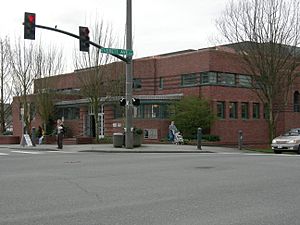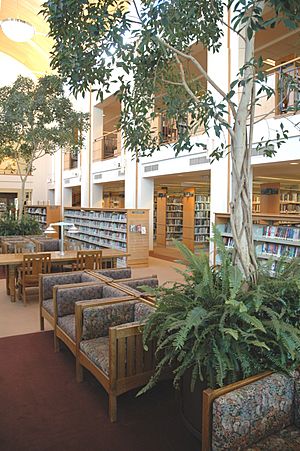Everett Public Library facts for kids
Quick facts for kids Everett Public Library |
|
|---|---|
 |
|
| Main Branch in Downtown Everett | |
| Type | Public library |
| Established | June 10, 1894 |
| Location | Everett, Washington, US |
| Coordinates | 47°58′55″N 122°12′39″W / 47.98194°N 122.21083°W |
| Branches | 2 |
| Collection | |
| Size | 254,569 items |
| Access and use | |
| Circulation | 1.3 million |
| Population served | 108,300 |
| Members | 41,629 |
| Other information | |
| Director | Abigail Cooley |
| References: Washington Public Library Statistical Report, 2016 | |
The Everett Public Library (EPL) serves the residents of Everett, Washington. EPL operates a main library at 2702 Hoyt Avenue and the Evergreen branch, at 9512 Evergreen Way. The main library overlooks Puget Sound and the southern end of Whidbey Island. The library has noteworthy artworks, including works by Dudley Pratt, Ransom Patrick, Guy Anderson, Jack Gunter, and Sonja Blomdahl. The library circulates over 900,000 items per year, provides exceptional book and media collections, reference services, on-line resources, in-home library services, and programs for adults, children and families. The library's staff includes specialists in adult reference, children's books, and local history. The Everett Public Library introduced a bookmobile service in May 1924; the first of its kind in Washington state, and the second in the West. It is also one of the few public library systems in the United States that has two full-time history specialists on staff. Northwest Room co-founders Margaret Riddle and David Dilgard retired after 31 and 40 years respectively, and their positions are currently filled by Lisa Labovitch with the second role waiting to be posted.
Contents
History
The town of Everett was incorporated in 1893, but its initial growth was quickly halted by the financial crisis that year. The Everett Public Library was created on June 10, 1894 by the Everett Woman's Book Club. On that day a group of local women met in the home of Mary Lincoln Brown to form the Book Club that would have as its aim the "improvement of the mind through the study of literature", but more specifically, the establishment of a public library. Interest in forming a library partly came about due to the lack of reading material for patients at Everett General Hospital, which was noticed by some of the club's members that were involved with the hospital's establishment.
The initial collection of 1,000 books was donated by members of women's clubs across the country. Gathering books and petitioning City Council when funds were scarce, the Everett Woman's Book Club set up a temporary library in the home of a member, with the city offering them three rooms in City Hall in 1898; service began on April 21 of that year. The Club continued to work for permanent quarters, next moving to a small building, and in 1905 the Everett Public Library became a Carnegie library after it received a $25,000 Carnegie grant to design an official library for the city of Everett.
Everett started the first bookmobile service in Washington state, and the second in the West in 1924. Nicknamed Pegasus, the Model T Ford remained in service until 1950. In 1992 the library re-acquired the vehicle, and began restoring it to as close to its original condition as possible. Pegasus briefly participated in Fourth of July parades and other community events, and was able to lay claim to being the world's oldest extant bookmobile; it currently resides in City storage. Bookmobile services continued utilizing a range of different vehicles until 2014, when the library had to eliminate its outreach department due to budget cuts.
By 1930 Everett had outgrown the Carnegie building, but with the Great Depression there was little hope of a new building. Industrialist Leonard Howarth left a bequest to the city which was used to erect a new $100,000 library at 2702 Hoyt Avenue. Seattle architect Carl F. Gould designed the facility, which opened October 3, 1934.
In 1962, the library expanded, doubling its shelving capacity. In 1981 an anonymous donor gave the library $75,000 to computerize its circulation, cataloging, and inventory systems. In 1985, the Evergreen Branch is opened, and in 1987 funding was approved to add an additional 20,000 square feet (1,900 m2) to the Main Library.
In 1991 expansion of the Main Library was completed. This expansion was designed by the Cardwell/Thomas Architects and B. Craig Thompson of Dykeman Architects. The expansion won an award from the American Institute of Architects. Except for some exterior renovation, the building remains largely unchanged, at 54,985 sq ft (5,108.3 m2), shelving capacity for 250,000 volumes and a parking garage that can hold 115 vehicles.
On November 28, 2018, Everett City Council approved funding for the expansion of the Evergreen Branch. Operations ceased at the branch location on December 24, 2018, and the renovated library reopened on December 6, 2019.
The original Carnegie building, located at 3001 Oakes, still stands but no longer houses the library. Over the years, it has been used as a funeral parlor, housed Snohomish County executive offices, and other County functions; it is currently the home of the Carnegie Resource Center for social services. The 1905 building is listed on the National Register of Historic Places.
Collections
Digital collections
Digital collections include:
- Everett Herald [1] - 131 images drawn from the 1950s and 1960s Everett Herald archives.
- Everett Massacre [2] - 215 images including photographs, art work, oral histories and movies.
Directors
- Alice McFarland (later Alice Duryee), 1898–1900
- Gretchen Hathaway, 1900–1907
- Jessie B. Judd, Interim Librarian, 1907
- Adelaide E. Wharton, 1907–1914
- Mary Frank, 1914–1916 (reportedly the first trained librarian to hold the position)
- Elizabeth Topping, 1916–1919
- Mabel Ashley, 1919–1946
- Fred M. Stephen, 1946–1949
- Phil Blodgett, 1949–1973
- Gary Strong, 1973–1976
- Victoire Grassl, Interim director, 1976–1977
- Mark Nesse, 1977–2007
- Eileen Simmons, (a Library Journal 2007 Mover & Shaker) 2007–2017
- Abigail Cooley, 2017–present


